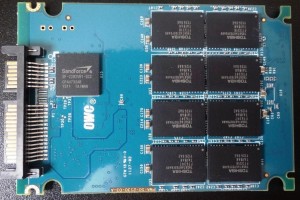Our report today will be a quick look at the recently updated OWC Mercury Extreme Pro 6G 240GB SSD with the new SandForce SF-2282 processor.
OWC is the first consumer SSD manufacturer to step up to the SF-2282 and bettered their 6G line even further yet with their memory switch to Toshiba 32nm NAND flash in both 120 and 240GB versions of the 6G. The good news here is they have instituted both upgrades without additional cost to the consumer.
As a bit of a refresh, you may recall that OWC had used Micron Sync 25nm NAND flash memory with a great deal of success and we wondered exactly why OWC would decide on the switch. The reputation of the Micron NAND is stellar and we were not aware of any performance upgrades that we could speak of between the two. Here is a look at the new 6g 240GB OWC SSD:

 As we stated, this is the first we have seen of the SF-2282 in a consumer drive and both remain to be 8 channel, however, the SF-2282 can handle 16 byte lanes simultaneously vice the 8 of the SF-2281. Although the difference should be translated to capacity alone, we did find a marked performance improvement with the new 6G in comparison to the original version in our Vantage HDD Test Suite.
As we stated, this is the first we have seen of the SF-2282 in a consumer drive and both remain to be 8 channel, however, the SF-2282 can handle 16 byte lanes simultaneously vice the 8 of the SF-2281. Although the difference should be translated to capacity alone, we did find a marked performance improvement with the new 6G in comparison to the original version in our Vantage HDD Test Suite.
There are also significant difference between the 240 and 120GB versions, in that, the 120 only contains 8 x Toshiba NAND flash memory modules unlike the 240GB which houses 16 and the 120GB version remains with the SF-2281. IN testing the 120GB version we also did not realize any change in performance through our testing. Heres a view of the 120GB version:

 We approached OWC for a bit of an idea on their consideration for the change and Grant Dahlke, OWC Marketing, PR & Social Media Manager stated this:
We approached OWC for a bit of an idea on their consideration for the change and Grant Dahlke, OWC Marketing, PR & Social Media Manager stated this:
“We switched to the Toshiba Toggle NAND as we saw a slight performance benefit when combining a 16 NAND device configuration with the 2282 processor like that found on the OWC Mercury Extreme 6G 240GB model. The toggle synchronous NAND also offers slight power savings. Using the Toggle NAND is a minor tweak as we’ve used synchronous NAND across our entire SSD line from the very beginning and this may be why we continually get praised by media sources for our most complete and detailed product specs in the industry. We’ve built our SSDs with the highest quality components available to offer the highest level of performance.”
In conducting our testing of the OWC Mercury Extreme Pro 6G 240GB drive last, we had just compared their firmware update here and were able to spot an increase in performance in some tests. We were happy to see the all important low 4k random scores to exceed the 100MB/s mark which had only been done by OWC prior. In this round, we never saw these scores to improve but did see marked improvements in our ATTO Disk Benchmark tests along with PCMark Vantage and a new program called Anvil Storage Utilities which shows the 6G reaching an amazing 83000 IOPS.
ATTO DISK BENCHMARK VER. 2.46
ATTO Disk Benchmark is perhaps one of the oldest benchmarks going and is definitely the main staple for manufacturer performance specifications. ATTO uses RAW or compressible data and, for our benchmarks, we use a set length of 256mb and test both the read and write performance of various transfer sizes ranging from 0.5 to 8192kb. Manufacturers prefer this method of testing as it deals with raw (compressible) data rather than random (includes incompressible data) which, although more realistic, results in lower performance results.
 In two separate rounds of testing previously (f/w updates), the highest write performance result we could achieve was 476MB/s whereas the new drive shows steady results of 511MB/s through repeated testing. Most manufacturers rely on ATTO as it tests in RAW or compressible data and is an excellent way to achieve the highest result, although not the most accurate depiction of true to life PC use. In testing incompressible data samples, no change in performance was observed.
In two separate rounds of testing previously (f/w updates), the highest write performance result we could achieve was 476MB/s whereas the new drive shows steady results of 511MB/s through repeated testing. Most manufacturers rely on ATTO as it tests in RAW or compressible data and is an excellent way to achieve the highest result, although not the most accurate depiction of true to life PC use. In testing incompressible data samples, no change in performance was observed.
 The SSD Review The Worlds Dedicated SSD Education and Review Resource |
The SSD Review The Worlds Dedicated SSD Education and Review Resource | 